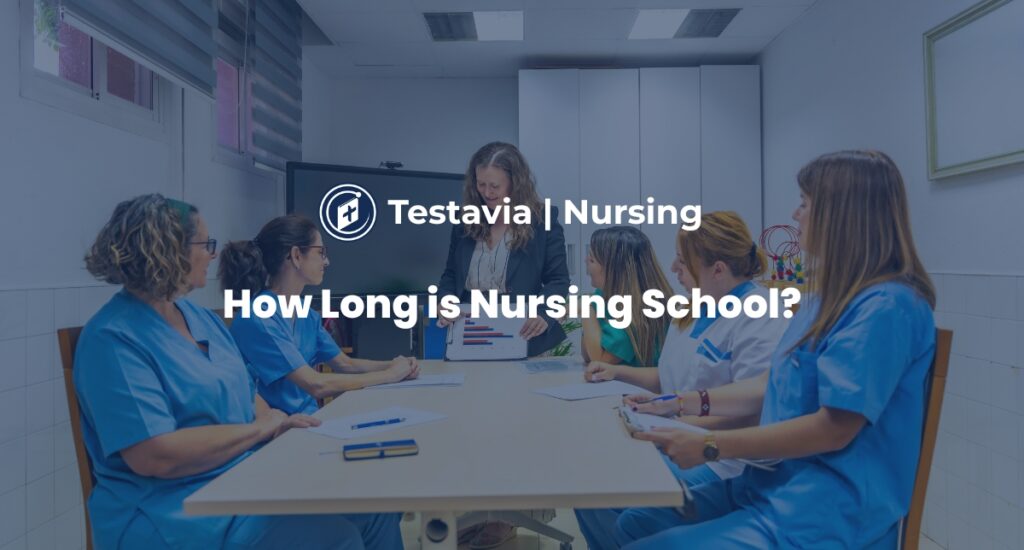
How long is nursing school?
The length of nursing school depends on the program and degree. A majority of nurse programs require between 2 and 4 years to complete, based on the route you select. Check here:
- CNA (Certified Nursing Assistant): 4-12 weeks
- LPN/LVN (Licensed Practical/Vocational Nurse): 1-1.5 years
- ADN (Associate Degree in Nursing): about 2 years
- BSN (Bachelor of Science in Nursing): about 4 years
If you are interested in more advanced positions, for example, nursing physician or nurse educator, Additional schooling could extend your training to 6-8 years.
Nursing school can be anywhere from a couple of months to a few years, depending on the nursing degree you choose and your career goals. I have highlighted all you need to know nursing school on the testavia nursing guide.
How Long is Nursing School?
The length of a nursing program will vary depending on the type and level of education offered.
Pre-licensure classes typically last between two and four years. Associate degree programs usually last two years, whereas bachelor’s degrees require four years.
Post-licensure alternatives, such as Registered Nurse to Bachelor of Science in Nursing (RN-to-BSN) programs, generally require at least 2 years of additional education. Knowing these timeframes helps you plan your career effectively.
Pre-Licensure Programs
Pre-licensure programs help individuals become Registered Nurses (RNs) and Licensed Practical/Vocational Nurses (LPNs/LVNs).
They typically provide classes and practical clinical training.
Common pathways include Associate Degree in Nursing (ADN), Bachelor of Science in Nursing (BSN), and hospital diploma programs.
Pre-Licensure Programs
Pre-licensure programs help individuals become Registered Nurses (RNs) and Licensed Practical/Vocational Nurses (LPNs/LVNs).
They typically provide classes and practical clinical training.
Common pathways include Associate Degree in Nursing (ADN), Bachelor of Science in Nursing (BSN), and hospital diploma programs.
Post-Licensure Programs
Post-licensure programs are designed for nurses looking to progress their careers.
They typically consist of a Bachelor of Science in Nursing (BSN), a Master of Science in Nursing (MSN), or other specialized certificates.
The programs typically provide flexible scheduling and online options for professionals who work.
Many post-licensure courses focus on developing leadership, clinical, or specialized skills, such as pediatric or geriatric skills.
Advanced education improves career progression opportunities and promotes professional growth in nursing.
Clinical Hours and Academic Coursework
The academic curriculum and the clinical hours are vital components of the nursing curriculum. Academic coursework and clinical time are crucial elements of nursing education.
Students apply their theoretical understanding in the healthcare setting through hands-on instruction. Practical experience helps to develop the essential abilities required by nursing professionals. Ethics and theology. They will gain a solid understanding of the concepts of the nursing profession.
By balancing both aspects, students are ready to face the challenges they will encounter as registered nurses while developing their skills across different medical scenarios.
Support Services Offered in Nursing School
Nursing schools usually offer various support services to help students succeed.
Academic counselling can help students select courses and develop career plans. Many programs provide tutoring in topics such as anatomy and Pharmacology.
In addition, mental health services are crucial for meeting the requirements of nursing training.
Peer mentoring programs foster connections and a sense of community among students. These programs create a positive environment that fosters academic confidence and improves effectiveness.
The length of nursing school depends on the program and degree. An Associate Degree in Nursing (ADN) typically takes two to three years of study, whereas the Bachelor of Science in Nursing (BSN) can require up to four years.
Higher degrees, such as the Master of Science in Nursing (MSN) or doctoral degrees, are more time-consuming and require additional time.
For the master’s program, you will need two more years of research, while doctoral programs could take between three and six years.
Each path offers distinct opportunities for specialization and professional advancement.
Timeframes for Becoming a Registered Nurse
The time needed to become a registered nurse (RN) depends on the educational path.
An Associate Degree in Nursing (ADN) typically lasts between one and three years to complete, whereas a Bachelor of Science in Nursing (BSN) generally requires four years of studies.
If you hold a previous degree and wish to speed up the pace of your education, BSN options can shorten the duration up to 12-18 months.
All options require passing the NCLEX-RN exam, which adds to the preparation and certification needed before becoming an RN.
Practical Nurse / Vocational Nurse Programs
Practical Nurse (PN) or Vocational Nurse (VN) courses are among the quickest routes to nursing. They typically take between 12 and 18 months to complete. They emphasise the most critical skills, such as patient care and clinical practice.
Students receive classes and hands-on experiences in health care settings. After graduation, they’re eligible to take the National Council Licensure Examination for Practical Nurses (NCLEX-PN), which qualifies them as registered practical nurses.
This accreditation allows them to work in hospitals, clinics, and long-term health facilities
Nursing School Program Comparisons
Nursing programs differ significantly in terms of structure and length. It is said that the Associate Degree in Nursing (ADN) generally takes about 2 years to complete, while a Bachelor of Science in Nursing (BSN) is a 4-year program.
Each program has specific advantages tailored to each student’s goals.
If you are looking for a more advanced position, such as pursuing the Master of Science in Nursing (MSN) or a doctoral degree, you can extend your studies for at least 6 months.
Knowing the distinctions between these two allows students to choose the best educational route to pursue immediate employment or more advanced positions.
Additional Nursing Degree Considerations
When planning a nursing school, it is essential to consider long-term career goals. Higher degrees, such as the Bachelor of Science in Nursing (BSN) or Master of Science in Nursing (MSN), can be a pathway to leadership roles and specific areas of practice.
Flexible programs, such as online or part-time options, help students balance professional and academic responsibilities while gaining essential nursing skills.
It is necessary to confirm the program’s accreditation to ensure quality before enrollment.
Fast-Track Options for Nursing Programs
These nursing schools provide an opportunity to boost your career for those looking to enter the field of healthcare rapidly.
They usually reduce the duration of their curriculum and clinical hours, allowing students to complete their education within 12-18 months.
Many schools offer fast-track courses leading to bachelor’s and associate’s degrees in nursing, therefore, these rigorous courses are designed for highly motivated students who can manage demanding schedules and academic and practical requirements.
This method allows for a faster transition from school to work compared to traditional courses scholarships for Nursing Students.
Conclusion.
Financial aid and scholarships are vital aids for students in nursing.
The cost of nursing school is often substantial, making financial aid necessary to achieve academic goals.
Numerous institutions offer scholarships based on academic merit, financial need, or other criteria.
In addition to federal and state grants, they can help ease the financial burden. In addition, federal and state grants can reduce financial burdens.
The Free Application for Federal Student Aid (FAFSA) allows applicants to apply for a variety of grants.
Work-study grants provide an income as well as experiences during your studies. If you are interested, contact the financial aid departments of the prospective schools. They often provide details on financial aid programs tailored to nursing school students. Using these resources will significantly aid the transition to a rewarding career in healthcare without incurring excessive debt.
